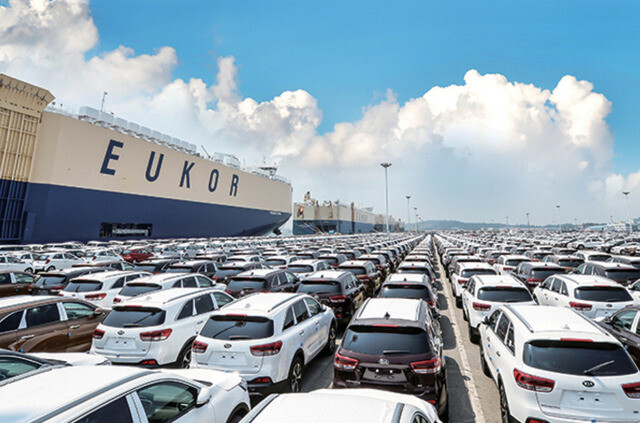hankyoreh
Links to other country sites 다른 나라 사이트 링크
Improved conditions in advanced economies has little impact on South Korean exports

Economic changes in the world’s advanced economies since the global financial crisis of 2007–08 are having a weaker impact on South Korea’s exports to those countries, a recent report indicated.
On Aug. 2, Bank of Korea (BOK) international economy research office research fellow Choi Moon-jung and research department director Kim Gyeong-geun published a report titled “The Effects of Importation Demand in Advanced Economies on South Korean Exports.”
In it, they conclude that while South Korean exports exhibited elasticity vis-à-vis G7 import demand prior to the financial crisis’s eruption in 2007, they have become inelastic since then. To analyze the ongoing decline in global trade since the crisis, Choi and the other researchers calculated import demand variables reflecting direct and indirect import structures for the advanced economies to examine changes in the effects of the advanced economies’ import demand on South Korea’s exports to those countries. The report focused on seven major economies (the US, Canada, the UK, Germany, France, Italy, and Japan) between the years 2000 and 2016.
According to the findings, different patterns of changing effects on exports were observed for demand in different sectors for the seven countries before and after the financial crisis. The effects of private consumption were only significant during the crisis period, and the decline in private consumption in the advanced economies during the crisis had a negative effect on the increase in exports. Public consumption had an impact on increasing exports after the crisis, indicating that the advanced economies’ economic stimulation measures had an influence on exports.
For the investment sector, the response of South Korean exports to investment was elastic prior to the crisis period but became inelastic afterwards. According to Choi, this appears to have been the major factor in the decline in income elasticity for South Korean exports to advanced economies.
“Prior to the global financial crisis, South Korea exhibited elasticity (2.22) with regard to import demand for the seven major economies, but became inelastic at 0.90 after the crisis,” the report observed.
Choi predicted, “Even if import demand increases as the economic recovery in the advanced economies expands going ahead, there is a possibility that South Korea’s exports to the advanced economies will not lead rapidly into a growth trend.”
By Lee Wan, staff reporter
Please direct comments or questions to [english@hani.co.kr]

Editorial・opinion
![[Editorial] Does Yoon think the Korean public is wrong? [Editorial] Does Yoon think the Korean public is wrong?](https://flexible.img.hani.co.kr/flexible/normal/500/300/imgdb/original/2024/0417/8517133419684774.jpg) [Editorial] Does Yoon think the Korean public is wrong?
[Editorial] Does Yoon think the Korean public is wrong?![[Editorial] As it bolsters its alliance with US, Japan must be accountable for past [Editorial] As it bolsters its alliance with US, Japan must be accountable for past](https://flexible.img.hani.co.kr/flexible/normal/500/300/imgdb/original/2024/0417/6817133413968321.jpg) [Editorial] As it bolsters its alliance with US, Japan must be accountable for past
[Editorial] As it bolsters its alliance with US, Japan must be accountable for past- [Guest essay] Amending the Constitution is Yoon’s key to leaving office in public’s good graces
- [Editorial] 10 years on, lessons of Sewol tragedy must never be forgotten
- [Column] A death blow to Korea’s prosecutor politics
- [Correspondent’s column] The US and the end of Japanese pacifism
- [Guest essay] How Korea turned its trainee doctors into monsters
- [Guest essay] As someone who helped forge Seoul-Moscow ties, their status today troubles me
- [Editorial] Koreans sent a loud and clear message to Yoon
- [Column] In Korea’s midterm elections, it’s time for accountability
Most viewed articles
- 1‘Right direction’: After judgment day from voters, Yoon shrugs off calls for change
- 2[Editorial] Does Yoon think the Korean public is wrong?
- 3[Editorial] As it bolsters its alliance with US, Japan must be accountable for past
- 4Where Sewol sank 10 years ago, a sea of tears as parents mourn lost children
- 5Japan officially says compensation of Korean forced laborers isn’t its responsibility
- 6[Guest essay] How Korea turned its trainee doctors into monsters
- 7Strong dollar isn’t all that’s pushing won exchange rate into to 1,400 range
- 8Umbrella with holes: New NK missiles prove Seoul’s defense system to be faulty at best
- 9Exchange rate, oil prices, inflation: Can Korea overcome an economic triple whammy?
- 10[News analysis] Watershed augmentation of US-Japan alliance to put Korea’s diplomacy to the test